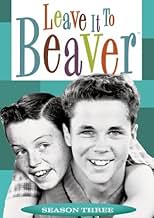Inspired after teacher Miss Landers reads a poem to his class about trees, Beaver worries about the tree that Ward planted for him on his birthday in the old neighborhood and decides to brin... Read allInspired after teacher Miss Landers reads a poem to his class about trees, Beaver worries about the tree that Ward planted for him on his birthday in the old neighborhood and decides to bring it to the Cleavers' new yard.Inspired after teacher Miss Landers reads a poem to his class about trees, Beaver worries about the tree that Ward planted for him on his birthday in the old neighborhood and decides to bring it to the Cleavers' new yard.
Featured reviews
I can't believe that a 10-year-old boy would react the way Beaver did just because he heard a poem about a tree.
I mean, Beaver was definitely doing something wrong here and yet it was somehow justified just because the tree was a birthday present.
When "Miss Landers" has the class recite a poetry about trees (comical bits ensue by Whitey, Judy and then Larry), it gets Beaver to thinking. He got a tree as a birthday present before he moved into his new house. Now, he wants to go back as get his tree because it belongs to him. At least that's the message he got confirmed by his mother when Beavers uses an analogy about "having a million dollars" and who it belongs to if even the banks move.
Thus, this also turns out to be a familiar storyline of Beaver literally and innocently believing something his mom or dad said, but neither part knowing exactly what's going on. These type of stories make you think and would make parents with young kids think even harder.
This is a good episode all around because it made you think it was another good representation of everyone involved. In other words, Beaver does what he normally does, same for his parents, and his classmates. Everyone is their self, and usually a good moral or lesson develops.
This one makes me want to go out and plant a tree!
Miss Landers assigns the memorization of a poem which is about trees and those who plant them. The students learn that a poem is not just a collection of words, but the evocation of a feeling or memory. Beaver, especially, learns to internalize the meaning of the words, since he has a personal experience with a tree. The episode not only emphasizes the beauty of poetry but also the connection between poetry and nature.
By the way, the poem they recite is actually the last stanza of Henry Cuyler Bunner's "The Heart of the Tree".
I call the episode poetic because Beaver is clearly deeply affected by the poem and Miss Lander's explanation of it. Miss Landers also explains how to read a poem meaningfully, a lesson which Beaver has taken to heart by the end of the episode when he is called upon to recite. The episode also raises questions about ownership and having a sentimental attachment to an object. It's not hard to imagine a tree becoming almost like a person in some people's eyes.
Did you know
- TriviaThe poem recited by Beaver's class in this episode is "The Heart of the Tree" by Henry Cuyler Bunner (1855-1896).
- GoofsWhen Wally and Beaver are standing in the kitchen door talking with their parents, the shadow of the boom mic can be seen passing over the door jamb.
- Quotes
Wally Cleaver: Aw, cut it out, Beaver! Parents can do what they want to do. You're a kid and you got no rights and go to sleep!
The Beaver: Gee, Wally. I'm almost sorry I woke you up!
Details
- Runtime
- 30m
- Color
- Aspect ratio
- 1.33 : 1
















